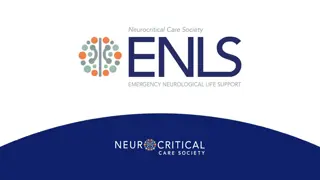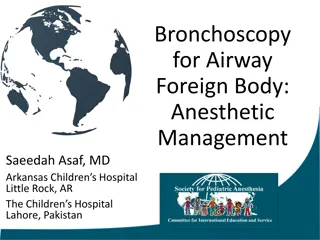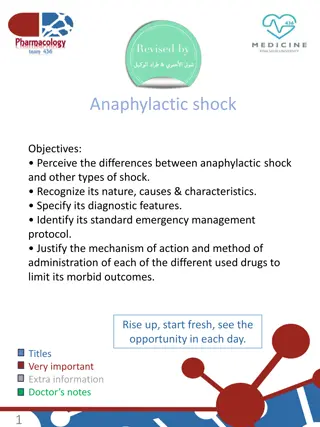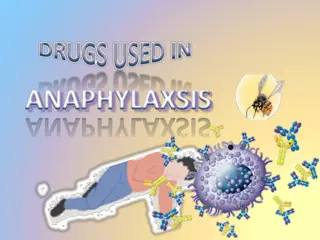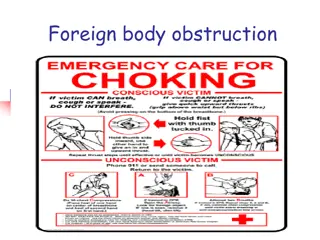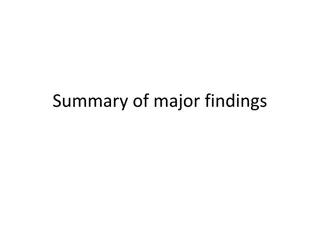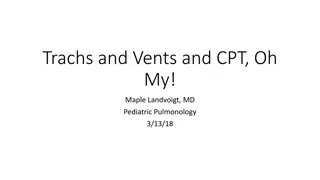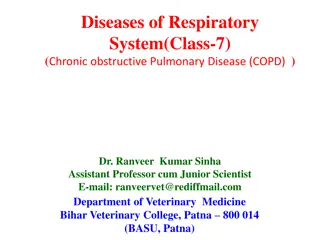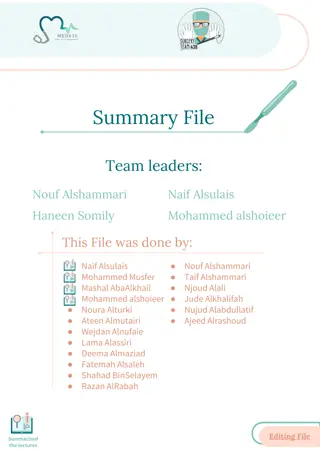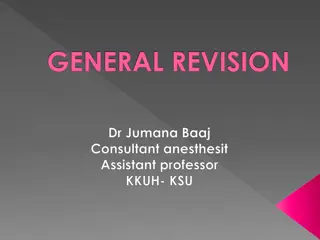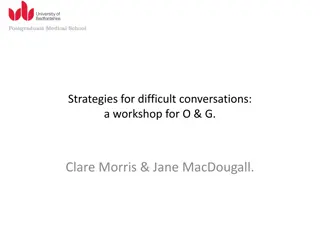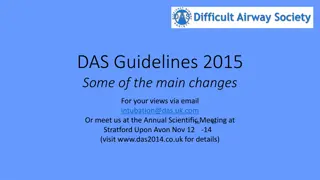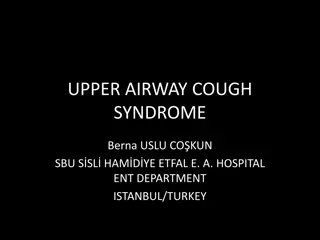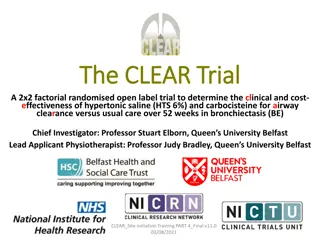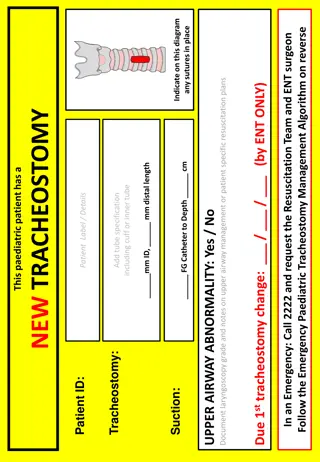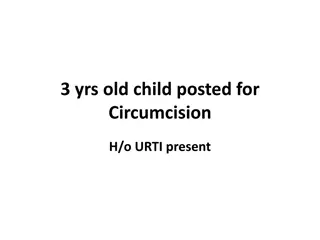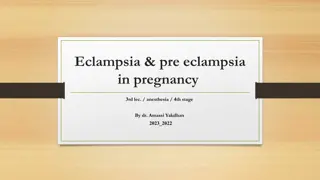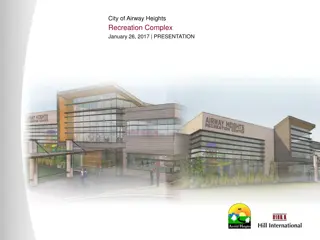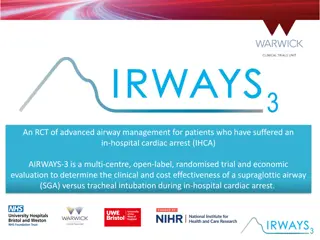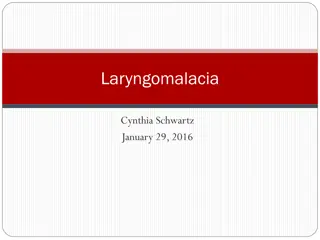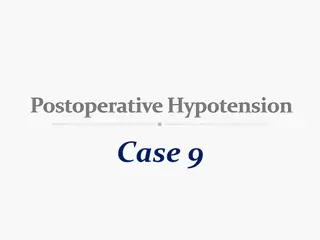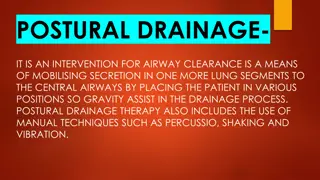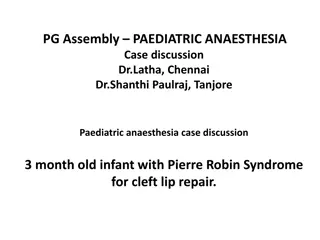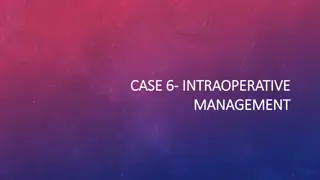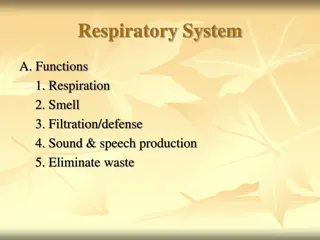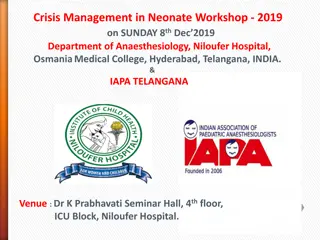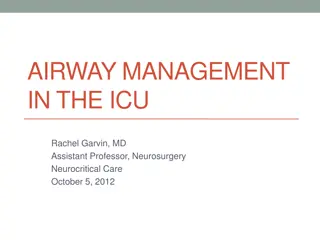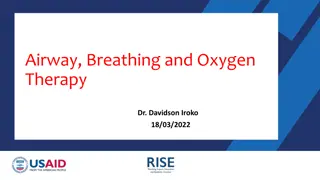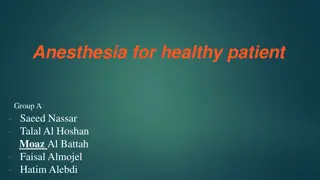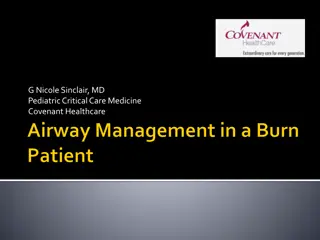Comprehensive ICU Protocol for Sedation, Analgesia, and Delirium Control by Dr. Vinod Srivastava
This comprehensive ICU protocol by Dr. Vinod Srivastava, an Associate Professor in Anaesthesiology & Critical Care at KGMU, covers key aspects such as sedation, analgesia, delirium assessment and control, stress ulcer and deep vein thrombosis prophylaxis, and glycaemic control in the ICU setting. Th
1 views • 50 slides
Approach to Critically Ill Patient: Primary Survey and Airway Management
This material provides a structured approach to managing critically ill patients, focusing on the primary survey steps including airway and cervical spine control. It covers assessment techniques, interventions, and guidelines for ensuring patient safety, particularly in cases of potential airway co
1 views • 38 slides
Airway Management in Neurological Patients: ENLS Version 5.0
Explore the essentials of airway, ventilation, and sedation in neurological patients through the ENLS Version 5.0 content. Understand the challenges and goals of managing airways in critical situations such as trauma or respiratory distress. Learn about common indications for intubation and the impo
0 views • 37 slides
Anesthetic Management of Bronchoscopy for Airway Foreign Body
This article discusses the anesthetic management of bronchoscopy for airway foreign body, including presentation, preoperative work-up, intraoperative management, and postoperative care. It highlights the incidence of foreign body inhalation, immediate and delayed presentations, findings on chest X-
2 views • 32 slides
Understanding Anaphylactic Shock: Diagnosis, Management, and Drug Therapy
Anaphylactic shock is a life-threatening allergic reaction that can lead to shock and airway swelling. Learn about the differences from other types of shock, diagnostic features, emergency management protocol, and drug therapy to limit morbid outcomes. Discover the nature, causes, and characteristic
1 views • 12 slides
Understanding Anaphylaxis and Anaphylactic Shock
Anaphylaxis is a severe allergic reaction affecting the entire body, while anaphylactic shock is a life-threatening manifestation of this reaction involving shock and airway swelling. This comprehensive material delves into the nature, causes, symptoms, diagnostic features, emergency management prot
0 views • 18 slides
Dealing with Difficult Patients: Strategies and Approaches in Psychiatry
This resource provides valuable insights into managing difficult patients in psychiatry, addressing characteristics, differential diagnosis, and behavioral strategies. It outlines common challenges such as substance use disorders, medical illness impact on personality, and difficult behaviors. The a
0 views • 38 slides
First Aid for Foreign Body Obstruction: Causes, Signs, and Management
Learn about the common causes of foreign body obstruction, preventive measures, signs of airway obstruction, and how to manage airway obstruction in adults, children, and infants. Discover the steps to take for a conscious choking victim and an unconscious victim, including performing the Heimlich m
0 views • 20 slides
Managing Difficult Employees and Disruptive Behaviors
Identify common types of difficult and disruptive employee behaviors, discuss the potential impact on the organization, and offer tips for constructive management in the workplace. Explore behaviors like gossiping, incivility, bullying, insubordination, and arrogance. Understand the metrics and lega
1 views • 20 slides
Insights on Airway Management in Anesthesia Practices
General anesthesia procedures in the UK NHS involve approximately 2.9 million cases annually, with airway management being a critical aspect. Poor airway assessment and planning, lack of strategies for difficult airways, reluctance to use awake fibreoptic intubation, and inappropriate use of supragl
0 views • 27 slides
Airway Clearance Techniques for Pediatric Patients with Special Healthcare Needs
Explore the strategies and technologies used to assist children with impaired airway clearance, including tracheostomy care, mechanical ventilator support, and supplemental airway clearance activities such as chest physiotherapy and oral care.
0 views • 28 slides
Chronic Obstructive Pulmonary Disease (COPD) in Horses: A Veterinarian's Perspective
Chronic Obstructive Pulmonary Disease (COPD) in horses is a respiratory condition caused by hypersensitivity reactions to allergens, viral infections, or bronchopneumonia. This chronic respiratory disease leads to decreased work performance, chronic coughing, abnormal lung sounds, and cardiac dysfun
0 views • 17 slides
Overview of Trauma Management in the Emergency Department
This summary file covers the key aspects of trauma management, including epidemiology of trauma, mechanisms of injury (penetrating and blunt), triage and severity scoring, primary survey with ABCDE approach, emergency department management per ATLS protocol, and adjuncts to primary survey. It emphas
0 views • 42 slides
Anesthesiology Lecture Series: Comprehensive Overview by Dr. Jumana Baaj
Delve into the realm of anesthesiology with Dr. Jumana Baaj's comprehensive lecture series covering the role of an anesthetist in preoperative care, NCEPOD classifications, perioperative patient journey, general anesthesia techniques, and airway management. Learn about patient assessment, anesthetic
0 views • 35 slides
Strategies for Difficult Conversations Workshop Overview
This workshop focuses on enhancing feedback skills and providing effective strategies for handling difficult situations and conversations in obstetrics and gynecology. It addresses the key premise that undermining behavior can be avoided through careful feedback, conflict management, and appropriate
0 views • 41 slides
Updates on DAS Guidelines 2015: Key Changes and Recommendations
Revised DAS Guidelines 2015 introduce significant updates for airway management. Changes include rebranding of plan elements, emphasis on oxygenation maintenance, use of videolaryngoscopes, and considerations for various airway scenarios. Specific modifications address techniques such as rapid seque
0 views • 7 slides
Dealing with Difficult Owners in Property Management
Explore the challenges property managers face when dealing with difficult owners, including scenarios of resident conflicts and the importance of board intervention. Learn about developing a complaint policy, understanding harassment responsibility, and ways to address issues effectively to maintain
2 views • 23 slides
Understanding Upper Airway Cough Syndrome and Chronic Cough Causes
Upper Airway Cough Syndrome (UACS) encompasses conditions like rhinitis and sinusitis, leading to chronic cough lasting more than 8 weeks. Common causes include asthma, GERD, and airway diseases. Differences in terminology between countries exist, with UACS being more widely accepted in the US. The
0 views • 42 slides
The CLEAR Trial: Investigating Hypertonic Saline and Carbocisteine in Bronchiectasis
The CLEAR Trial is a 2x2 factorial randomized trial examining the effectiveness of hypertonic saline and carbocisteine for airway clearance in bronchiectasis over 52 weeks. Led by Professor Stuart Elborn and Professor Judy Bradley from Queen's University Belfast, the study focuses on exacerbation ma
2 views • 16 slides
Emergency Paediatric Tracheostomy Management Algorithm
Emergency Paediatric Tracheostomy Management Algorithm provides a structured approach for managing pediatric patients requiring tracheostomy in emergency situations. The algorithm outlines steps for assessing airway patency, performing suction, and changing the tracheostomy tube if necessary. It emp
0 views • 4 slides
Dealing With Difficult Patients: Strategies for Effective Patient Management
Learn valuable insights from "Dealing With The Difficult Patient" by Victor B. Klausner, DO. The content emphasizes the importance of handling challenging patient interactions with empathy, professionalism, and ethical conduct. It provides practical tips on communication, patient empowerment, managi
0 views • 13 slides
Preoperative Considerations for Circumcision in a 3-Year-Old Child with URTI
Preoperative assessment and management play a crucial role in optimizing outcomes for young children undergoing elective circumcision, especially when the child has a history of upper respiratory tract infection (URTI). Factors such as URTI severity, parental smoking, airway anomalies, and history o
0 views • 17 slides
Management of Eclampsia and Pre-eclampsia in Pregnancy: Anesthesia Considerations by Dr. Amassi Yakdhan
This comprehensive guide covers the management of hypertension terms in pregnancy, including chronic hypertension, gestational hypertension, pre-eclampsia, and eclampsia. It discusses the risks associated with high blood pressure during pregnancy and the potential complications such as multi-organic
0 views • 12 slides
City of Airway Heights Recreation Complex Overview
The City of Airway Heights Recreation Complex, presented in January 2017, is a 35,000 SF facility featuring softball/soccer fields, gym, lap pool, therapy and children's recreation pool, Jacuzzi, and more. The complex faces challenges such as basalt bedrock, paleochannel, and cultural resources, wit
0 views • 12 slides
AIRWAYS-3 Trial: Advanced Airway Management in In-Hospital Cardiac Arrest
AIRWAYS-3 is a multi-centre, open-label, randomized trial evaluating the clinical and cost effectiveness of a supraglottic airway (SGA) versus tracheal intubation during in-hospital cardiac arrest (IHCA). The trial aims to determine the functional status and health-related quality of life outcomes o
0 views • 9 slides
Laryngomalacia: Causes, Symptoms, and Management
Laryngomalacia is a condition characterized by the inward collapse of supraglottic structures during inspiration, leading to intermittent airflow obstruction. It is a common cause of neonatal and childhood stridor, with symptoms typically appearing within a few weeks after birth. The condition can b
0 views • 16 slides
Postoperative Hypotension: Management and Recovery Strategies
In a case of postoperative hypotension following a transurethral prostatectomy under spinal anesthesia, a 78-year-old patient presented with agitation and shivering in the PACU. Vital signs and pain scores were monitored, showing a blood pressure of 89/40, heart rate of 85/min, and respiratory rate
0 views • 16 slides
Awake vs. Deep Extubation: An Anesthesia Comparison
Explore the differences between awake and deep extubation techniques in anesthesia practice, including learning objectives, stages of anesthesia, safe execution, risks, benefits, appropriate candidates, and management of airway complications. Understand the criteria for awake extubation and indicati
0 views • 22 slides
Postural Drainage Therapy for Airway Clearance
Postural drainage therapy is an intervention used for airway clearance by mobilizing secretions in specific lung segments towards the central airways. It involves placing the patient in various positions to facilitate gravity-assisted drainage. The therapy includes manual techniques such as percussi
0 views • 13 slides
Mastering Difficult Conversations in the Workplace
Learn how to handle challenging discussions effectively with this guide. Discover why conversations become difficult, strategies for preparation, emotional management, and post-conversation steps. Explore scenarios, insights on what makes conversations tough, and the impact of avoidance. Don't let c
0 views • 31 slides
Paediatric Anaesthesia Case Discussion: Challenges of Anaesthetizing an Infant with Pierre Robin Syndrome
Pierre Robin Syndrome (PRS) presents challenges in paediatric anaesthesia, especially in infants undergoing procedures like cleft lip repair. PRS is characterized by micrognathia, glossoptosis, and respiratory distress. Other syndromes associated with cleft lip include Treacher Collins syndrome, Gol
0 views • 56 slides
Preoperative Assessment and Management for Squint Surgery in a 4-Year-Old Male Patient
Assessing a 4-year-old male patient booked for right eye squint surgery involves evaluating his preoperative risks, conducting necessary tests, assessing medication needs, and ensuring fasting protocols are followed. Key aspects include reviewing medical history, conducting physical examinations, ad
0 views • 14 slides
Effective Strategies for Difficult Conversations and Conflict Management
Empower yourself with early responses, recognize barriers, and actively participate in difficult conversations. The Conflict Management & Human Rights Office offers services like facilitation, coaching, mediation, and education to support individuals in managing conflicts effectively. Identify signs
0 views • 25 slides
Overview of the Respiratory System Functions and Anatomy
The respiratory system has vital functions such as respiration, smell, filtration/defense, sound & speech production, and waste elimination. It consists of external (root, bridge, apex, and nostrils) and internal components (nasal cavity, pharynx, larynx). The nose/nasal cavity provides an airway fo
0 views • 37 slides
Crisis Management in Neonate Workshop 2019 at Niloufer Hospital, Hyderabad
A workshop on Crisis Management in Neonate is scheduled to be held on December 8th, 2019, at Niloufer Hospital, Osmania Medical College, Hyderabad, India. The event aims to enhance knowledge and skills in neonatal venous access, intubation techniques, airway management, and cardiovascular challenges
0 views • 5 slides
Airway Management in the NeuroICU: Importance and Strategies
Understanding the crucial role of airway management in the NeuroICU is essential for preventing secondary brain injury and addressing respiratory complications in neurologically-injured patients. This presentation covers the significance of airways, common issues, evaluation techniques, adjuncts, an
0 views • 45 slides
Airway, Breathing, and Oxygen Therapy - ABCDE Approach Overview
ABCDE approach is a systematic method for evaluating acutely ill patients to identify and address life-threatening conditions promptly. This presentation focuses on the Airway and Breathing components, emphasizing the assessment, management, and interventions to maintain a clear airway and adequate
0 views • 18 slides
Anesthesia Preparation and Airway Assessment for Knee Arthroscopy Patient
An overview of preparing a diabetic patient for knee arthroscopy surgery, including considerations for anesthesia, diabetes management, and airway assessment. The patient in this case study has a torn meniscus and is categorized as ASA Class 2. Steps to ensure optimal diabetes control, preoperative
0 views • 19 slides
German Patient Liga - Supporting Patients with Airway Diseases for 26 Years
German Patient Liga, also known as the Airway Diseases DPLA e.V., is a dedicated organization providing support and resources for patients with conditions such as asthma, COPD, lung transplantation, and cough. With a focus on up-to-date guidelines, lung sports, education, rehabilitation, and advance
0 views • 5 slides
Pediatric Burn Patient Airway Management Overview
Understand the critical aspects of early intubation in pediatric burn patients, including challenges with facial and chest burns, appropriate airway placement strategies, respiratory compromise, and mechanical ventilation strategies for optimal outcomes. Explore a case study of a 4-year-old male wit
0 views • 22 slides


